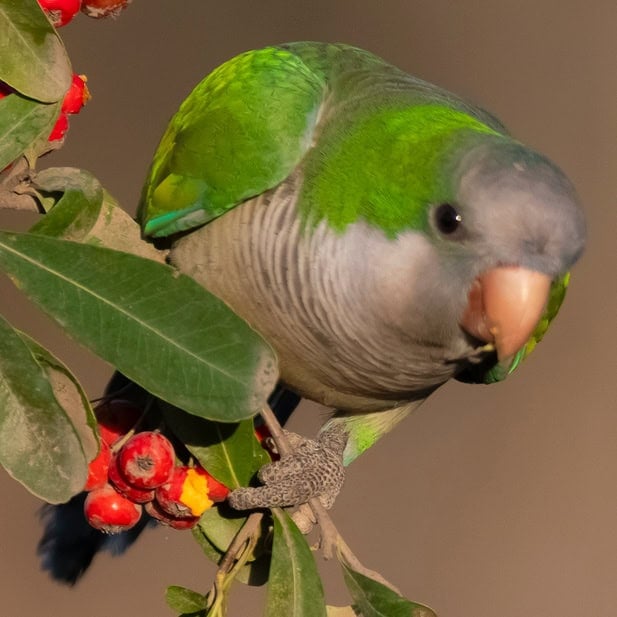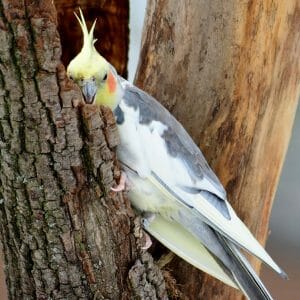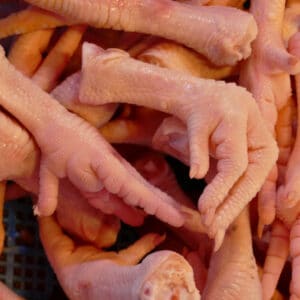Last Updated on by Catherine Tobsing
Pet birds add vibrancy and life to our homes with their beautiful colors and charming sounds (I’ve always found smoke alarm sounds to be charming or was that until I got a __________ in my home.
However, feeding them properly requires more than just filling their bowls with random mixtures of seeds fruits, and nuts.
With insights from veterinarians, ornithologists, and other avian experts, we navigate the complexities of a bird’s diet to ensure their health and happiness.
Understanding Bird Diets: From Natural Habitats to Home Cages
In the wild, birds enjoy a varied diet, something that cannot necessarily be mimicked in captivity.
That’s because you can never “dial in” food from nature.
Fruits in the wild for example hold nowhere near the sugar content found in supermarket fruit.
Unlike their ancestors, pet birds aren’t subjected to the same natural selection pressures but their nutritional needs remain complex and varied. This diversity is crucial for their health and longevity.
Formulated Diets: A Balanced Approach
Many pet owners opt for commercially available formulated diets, which include pellets, crumbles, and nuggets.
These are designed to provide up to 80% of a bird’s nutritional needs in a balanced form.
However, it’s essential to choose a product that is specifically tailored to the species of your bird to prevent nutritional imbalances that can lead to health and behavioral issues.
Pellets can not only be different by their sizes but by their formulations as well so make sure you’re feeding the correct caloric intake for your bird’s species.
The Role of Fresh Foods
Despite the convenience of formulated diets, fresh fruits and vegetables play a critical role in a bird’s diet.
They not only provide essential vitamins and minerals but also offer variety and enrichment, helping to stave off boredom.
Here’s a guide to some beneficial fresh foods for birds:
Vegetables: Include a variety of greens such as kale, spinach, and broccoli, along with carrots and sweet potatoes.
Fruits: Offer apples, pears, and melons, but remember to remove all seeds first, as they can be toxic to birds. Citrus can cause birdy heartburn which can lead to plucking.
Special Dietary Considerations for Different Bird Types
Birds fall into various dietary categories based on their natural food preferences:
Granivores: such as budgies and macaws, primarily eat seeds and grains.
Frugivores: including many types of macaws, favor fruits along with nuts and seeds.
Nectarivores: like lorikeets, thrive on a diet of nectar and pollen.
Each type requires a specific balance of nutrients to mimic their natural diets as closely as possible.
Nutritional Challenges and Solutions
One of the biggest challenges in feeding pet birds is ensuring they get a balanced intake without over-relying on their favorite seeds, which might lead to deficiencies.
Incorporating a variety of food types and regularly rotating them can help ensure a more balanced diet and reduce selective eating behaviors.
The Importance of Nutritional Research
While commercial diets are scientifically formulated, they cannot exactly replicate the variety found in a bird’s natural environment.
This discrepancy underscores the importance of continuous research and development in avian nutrition to improve the quality and suitability of captive bird diets.
Health Implications of Dietary Choices
Nutrition directly impacts a bird’s health. A poor diet can lead to malnutrition, which is a common cause of illness and death in pet birds.
It is crucial to understand the content and balance of your bird’s diet and adjust it as necessary based on their health and activity levels.
Feeding Strategies for Optimal Health
Introducing new foods to a bird’s diet should be done gradually and with careful observation.
Regular weigh-ins can help track your bird’s acceptance of new foods and ensure they maintain a healthy weight.
It’s also advisable to consult with a veterinarian to tailor a diet that suits your bird’s specific health needs.
Conclusion: A Commitment to Avian Health
Feeding your bird properly is an ongoing commitment that requires attention and knowledge.
By understanding the specific dietary needs of your bird, incorporating a variety of appropriate foods, and monitoring their health closely, you can ensure that your feathered friend leads a long, healthy, and happy life.
Remember, each bird is unique, and their diet can greatly influence their overall health and behavior.
Tailoring their nutrition based on individual needs and regular veterinary advice can make all the difference in their quality of life.
This comprehensive approach to bird nutrition not only helps in maintaining their health but also enhances their well-being, making your relationship with your pet bird all the more rewarding.
Written by Mitch Rezman and the Windy City Parrot Content Team
Author Profile
Latest entries
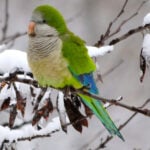 The Traveling BirdJune 26, 2025Can You Name 5 Parrot Species That Are Living Wild in the USA?
The Traveling BirdJune 26, 2025Can You Name 5 Parrot Species That Are Living Wild in the USA? Bird BehaviorJune 26, 2025How is it Parrots Are Problem Solvers Social Animals and Even Use Tools?
Bird BehaviorJune 26, 2025How is it Parrots Are Problem Solvers Social Animals and Even Use Tools?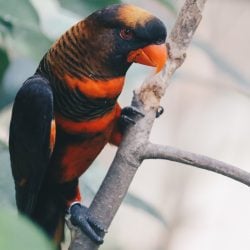 Bird & Parrot AnatomyJune 25, 2025How a Tiny Chemical Modification Makes Parrots Nature’s Living Paintings
Bird & Parrot AnatomyJune 25, 2025How a Tiny Chemical Modification Makes Parrots Nature’s Living Paintings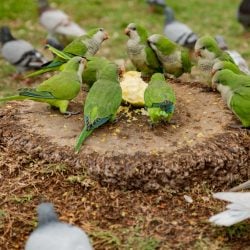 PigeonsJune 20, 2025How Do Parrots Thrive in Cities Outside Their Native Habitats?
PigeonsJune 20, 2025How Do Parrots Thrive in Cities Outside Their Native Habitats?
